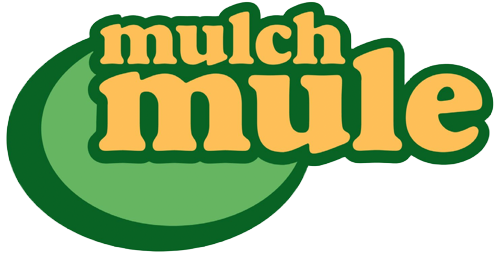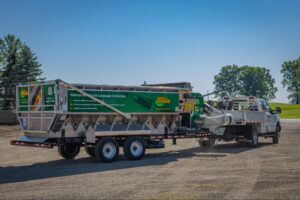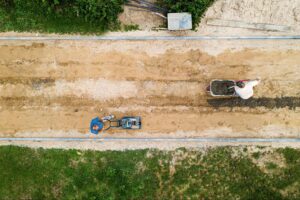The landscaping industry is entering a new era with the transformative power of artificial intelligence (AI). Facing industry labor shortages and rising costs, landscapers are increasingly turning to advanced automation techniques to streamline operations, reduce manual tasks, and boost efficiency. Many companies that adopt these technologies may gain a competitive edge, meet evolving customer expectations, and improve overall profitability.
This article explores how AI is reshaping landscaping through practical applications such as optimized scheduling, predictive maintenance, automated material handling, and safety enhancements. It also examines how solutions like the Mulch Mule trailer fit into an evolving trend of automation-based strategies that help businesses transform operations throughout the year.
The Growing Role of AI for Landscapers
Although not yet universal across the landscaping sector, AI-powered solutions are increasingly recognized by industry leaders for their potential to significantly enhance efficiency. With a limited pool of skilled workers and rising operational costs, many businesses are deploying AI to automate time-consuming tasks, deliver faster results, and reduce errors.
In landscaping, AI tools can analyze data, recognize patterns, and provide insights that improve scheduling, maintenance, and resource management. By reducing manual labor and enhancing precision, AI helps companies tackle tight project timelines and keep pace with shifting demands. These technologies also optimize resource usage, lowering expenses related to fuel, water, and maintenance.
AI-Driven Efficiency Enhancements for Lawn and Landscape Companies
AI streamlines operations by cutting down wasted time and minimizing overhead. Key applications include:
Automated Scheduling and Route Optimization
AI-powered scheduling software analyzes factors like traffic patterns, job proximity, and crew availability to determine the most efficient routes. This optimization minimizes travel time and fuel consumption, allowing crews to complete more jobs and maintain a steady flow of operations.
Predictive Maintenance for Equipment
Predictive maintenance systems use AI to analyze operating data and send alerts when equipment shows signs of wear. By catching issues early, businesses can schedule repairs before breakdowns occur, reducing downtime and unplanned disruptions.
Automation in Material Handling
Material handling tasks—such as loading and transporting heavy materials—are increasingly automated. Technologies including live floor systems and conveyor-operated trailers reduce manual labor, improve precision, and speed up material distribution. Likewise, value-adding attachments enable more agile, efficient operations on the job site.
Boosting Landscaping Productivity with AI Tools
Beyond efficiency, AI elevates productivity by simplifying project management and resource allocation.
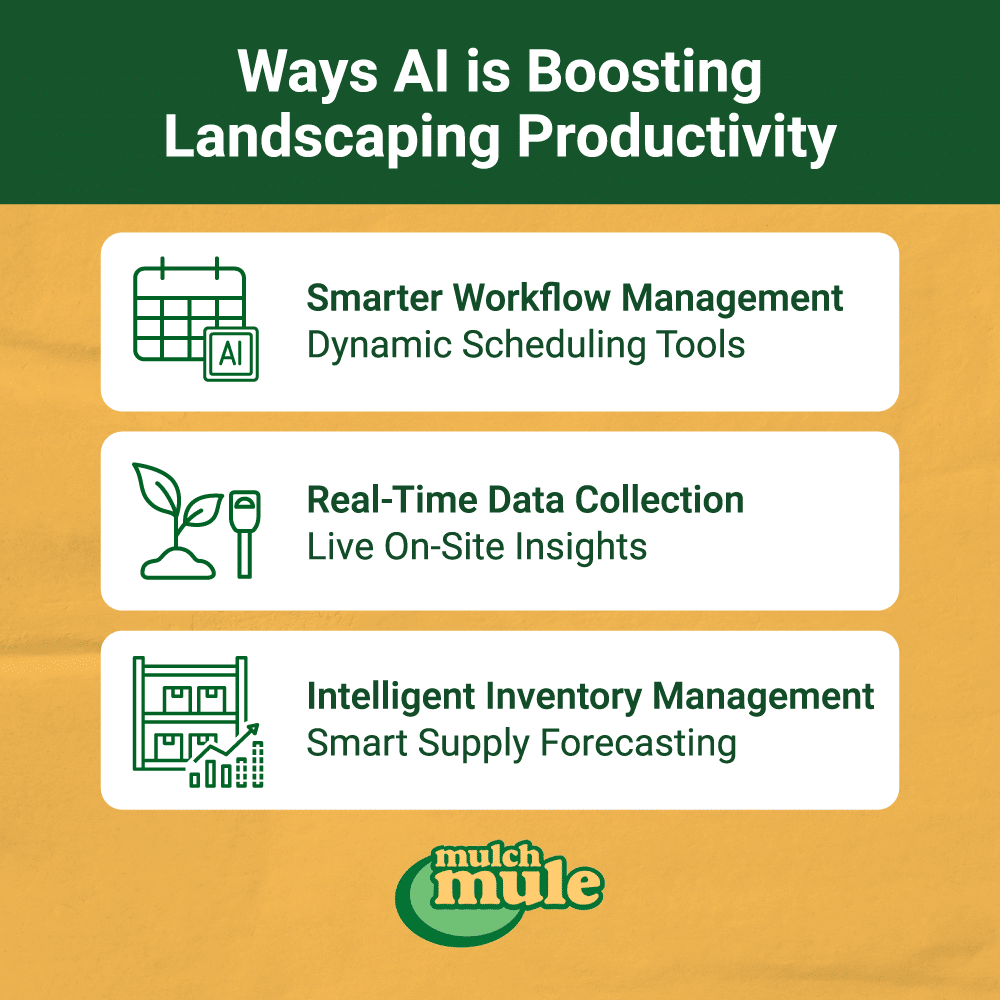
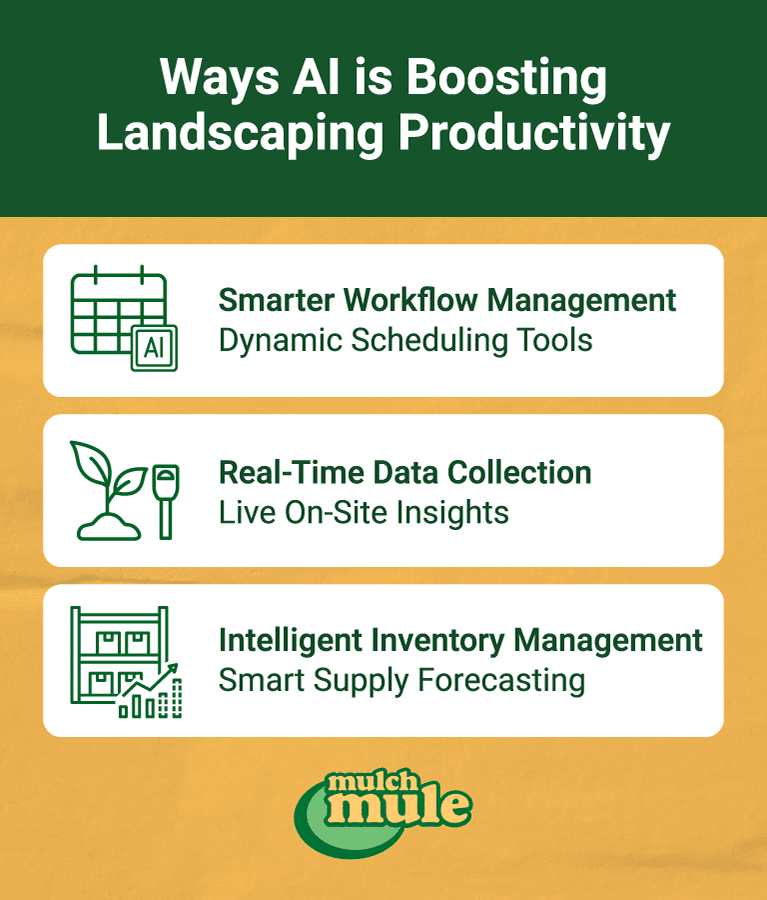
Smarter Workflow Management
AI platforms integrate with existing systems to dynamically adjust schedules. In the event of unexpected changes, AI recalculates timelines and reallocates resources, keeping projects on target while mitigating operational hiccups.
Real-Time Data Collection
Smart sensors built into equipment and on-site installations gather real-time data on factors like soil moisture, temperature, and equipment performance. The collected data helps AI systems adjust operations—such as modifying watering schedules—to improve project quality while reducing the need for manual oversight.
Intelligent Inventory and Supply Chain Management
AI systems track material use and forecast demand so landscapers only order what they require, preventing overstock and waste. Automated inventory management lowers costs while keeping operations running smoothly.
Safety Advancements Through AI in Landscaping
Enhanced safety is a vital benefit of AI integration. Proactive solutions help reduce job site accidents while protecting worker health.
Proactive Hazard Detection
AI-powered cameras, sensors, and wearables monitor job sites to identify potential dangers. These systems detect unsafe conditions—such as slippery surfaces or unexpected equipment movements—and issue real-time alerts, allowing teams to address risks before injuries occur.
Monitoring Worker Health
AI-equipped wearables keep an eye on vital signs like heart rate and fatigue levels. Alerts for abnormal readings prompt supervisors to adjust workloads or schedule breaks, reducing the risk of overexertion and heat-related incidents.
Safer Task Automation
Automating physically demanding tasks lowers the risk of repetitive-stress injuries. AI-directed machinery handles hazardous or labor-intensive operations, allowing employees to focus on oversight and problem-solving, ultimately reducing workplace accidents.
Cost Reduction Strategies with AI Integration

AI significantly cuts operational expenses without diminishing service quality.
Lowering Labor Costs with Automation
By using AI-enabled irrigation systems, robotic equipment, and automated material handling, companies reduce the need for large crews. This enables organizations to allocate human resources to higher-value tasks while lowering overall labor expenditures.
Reducing Downtime with Predictive Maintenance
AI-driven predictive maintenance recognizes equipment issues before they escalate, minimizing unplanned downtime. Regular, data-driven maintenance extends equipment life and helps landscapers avoid costly repairs.
Optimizing Resource Use
AI platforms track crew assignments, resource usage, and task sequencing to streamline workflows. Effective routing and precise inventory management cut back on fuel, material waste, and labor hours, ensuring cost-effective operations.
Year-Round AI Applications in Landscaping
One of AI’s strengths is its flexibility in responding to seasonal demands, allowing landscaping businesses to maintain steady operations throughout the year.
Adapting to Seasonal Shifts
By merging real-time weather data with historical trends, AI tools help companies plan tasks like leaf collection in fall and recurring commercial mulch projects in the Spring. Efficient scheduling based on reliable forecasts reduces delays and keeps projects on target.
Multi-Season Equipment Management
AI monitors equipment usage year-round, scheduling maintenance as required and ensuring tools remain in top shape. This consistent upkeep keeps productivity high across all seasons.
Real-Life Applications of AI in Lawn and Landscape Companies
Practical examples demonstrate how AI delivers tangible benefits. Route optimization software allows companies to complete more daily jobs by reducing travel time and improving scheduling. Robotic mowers handle repetitively demanding tasks, while AI-enabled irrigation systems adjust watering in response to soil and weather data—conserving resources and promoting eco-friendly practices.
Automated material handling equipment for loading and unloading bulk materials also showcase AI’s positive influence. By reducing the strain on employees, these tools shorten project timelines and mitigate safety risks.
Mulch Mule’s Role in Automation-Driven Landscaping Solutions
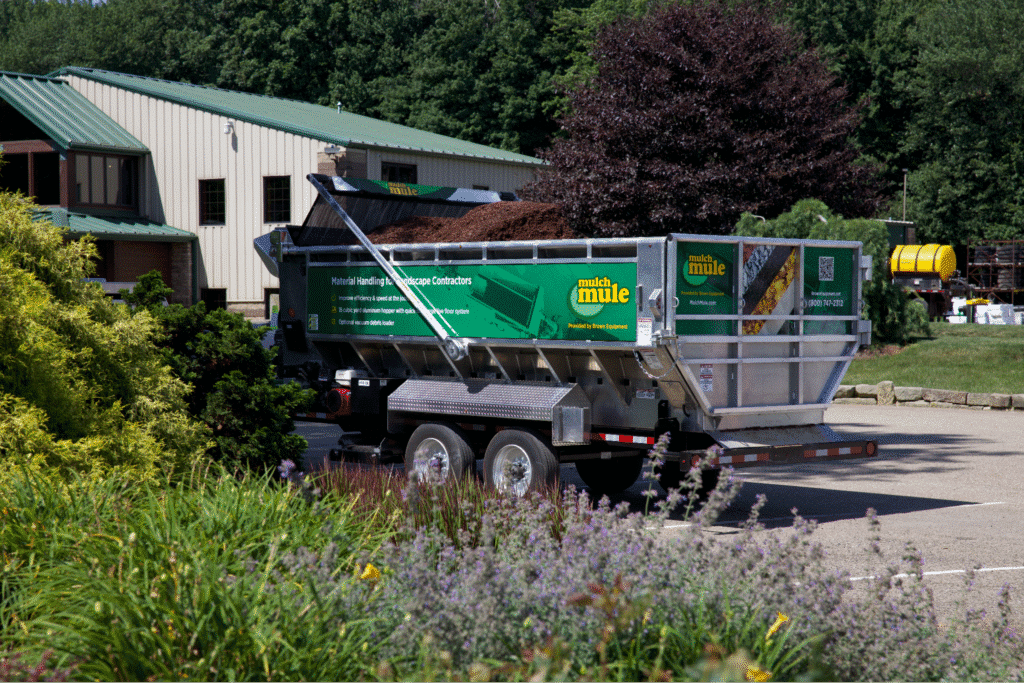
Mulch Mule provides innovative automation products for bulk material handling in landscaping. The Mulch Mule trailer automates the loading, transporting, and unloading of materials through a high-capacity aluminum hopper and a rapid-discharge live floor system. These capabilities elevate both precision and speed, cutting back on the manual labor normally associated with large-scale tasks.
Mulch Mule’s optional attachments and upgrades enable the equipment to handle varied tasks and seasonal demands. For example, the Billy Goat® vacuum attachment makes managing leaves in autumn more efficient. This versatility makes Mulch Mule a practical choice for businesses looking to remain agile and profitable.
Watch a Testimonial From a Real Mulch Mule User
Improved profitability, streamlined operations, ease of use, and boosted employee morale are just a few of the advantages of using the Mulch Mule for delivering mulch, soil, gravel—and for vacuuming leaves in the fall. Andrew and Anthony Gage are proud owners of two Mulch Mules and satisfied with the results. Click the video below to hear them share their experience!
VIDEO: Gage Brothers Property Management – https://youtu.be/_NMKT_0efOc?si=l9jdvIXdOzYR_BhI
Embracing the Future: AI as the Catalyst for Landscaping Innovation
AI is redefining the landscaping industry by improving efficiency, safety, and cost management. From automated scheduling and predictive maintenance to streamlined material handling and data-driven insights, AI-powered solutions help businesses overcome traditional hurdles and boost overall productivity in a steadily evolving marketplace.
Ready to transform your operation for success? Contact us today and discover how Mulch Mule’s trailer solutions and innovative attachments can seamlessly integrate with AI-based strategies. Explore their offerings or reach out to the team to see how embracing AI and specialized equipment can revolutionize your landscaping business.
